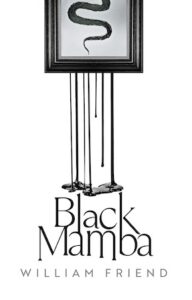Plain shelves and glittering prose
by William FriendWilliam Friend’s debut novel Black Mamba is a chilling tale of hauntings, fatherhood, sexual attraction and the taboos of grief. Since his wife Pippa died suddenly nine months ago, Alfie has been struggling to look after their twin daughters. When they tell him one night there’s a man that comes to them in their room, he turns to his wife’s twin sister Julia, a psychotherapist, for help. Eventually things get darker and they all must face up to their loss and anguish, and to the shape-shifting presence that is taking over the twins’ lives.
William takes us on a whistlestop tour of his current book collection.
Tell us about the bookshelves in your home.
I’ve moved home recently, so my bookshelves are currently in disarray, with most of their contents still in cardboard boxes. The plan, though, is eventually to have two bookcases in the room that will be my ‘writing room’, once I’ve bought a proper desk for it. (I wrote Black Mamba mostly on trains and at my kitchen table, so it will be a real luxury to have a dedicated space for any future scribbling.)
My book collection contains a decent mix of fiction, non-fiction – history, art history, theology and psychology, principally – and literary criticism, in three roughly equal proportions. It’s currently only a modest collection, as most of the texts I acquired during my university days are still in my parents’ house, apart from a few indispensables. I’m sure my mum and dad will rebel eventually, and dump the whole lot on me, but until then I’m savouring the free storage…
Which books are your most recent bookshelf additions?
It was my birthday in February, so I was given quite a few then – Lear Wife by J.R. Thorp, The Château by William Maxwell, and Edmund Gordon’s wonderful biography of Angela Carter, which I’ve now almost finished. I think it may be the first biography of a writer that I’ve ever read, and I’ve been surprised by how much I’ve enjoyed it. I’m interested to see whether anything I’ve learned about Carter changes the way I respond to her fiction the next time I read, or reread, any of it.
Do you judge people by their bookshelves?
Of course not. It’s down to everyone to decide for themselves what they read, how much they read, or even whether they read at all – who am I to pass judgment? Of course, I enjoy reading, and I know what I like and don’t like, but if someone disagreed with my preferences I can’t think why that would change my basic impression of them. No one is obliged to read or like my work either – a good incentive to give every sentence my all.
Which is your most treasured book?
I’m not sure. My favourite book is probably Carter’s The Bloody Chamber, which I first read when I was 16. I went to an all-boys school, and Carter was far from the most popular writer we studied, but I had a visceral reaction to the stories in the collection that has never really gone away. The combination of Carter’s glittering prose, the depth of the tales’ symbolic meaning, and her unabashed enjoyment of a ‘low’ narrative mode in the form of the Gothic was inspiring to me, and I still reread at least a few of the stories each year.
That said, I’m not sure I could describe my copy of Chamber as treasured, exactly. I mean, if my home were on fire, I wouldn’t run back inside to retrieve it – I’d just buy another copy. The book I’d be most disappointed to lose is probably my encyclopedia of witchcraft and demonology: a huge compendium, written by someone called Rossell Hope Robbins. The book only fell into my hands a few years ago, when I stumbled upon it on my parents’ bookshelf. Neither of them seemed entirely certain where it had come from, which only augmented my connection to it. I don’t treasure it, exactly, but I can certainly recommend it as a wealth of fascinating details about European folklore and occult beliefs. It was very useful to me when writing Black Mamba, and I’m sure I’ll use it again for other projects.
In spite of my love of lush, decadent prose like Carter’s, in real life I’m remarkably bad at surfaces. I tend to buy plain furniture, plain clothes, plain everything. I just don’t have an eye for that sort of thing.”
What do your bookshelves say about you?
Not a great deal, I suspect, except perhaps that I don’t read as widely or as prolifically as you might expect of an aspiring young writer. I tell myself that it’s better to read a handful of books deeply each year than a hundred superficially, but that’s probably self-justification. The truth is that I don’t make half enough time for reading as I probably should. Even so, the books that are present and correct would give someone a reasonable feel for my literary tastes: Hilary Mantel, John Banville and Shirley Jackson are all staples.
As for the shelves on which the books themselves sit, they say even less about me, or at least I hope they do. They’re cheap, plain, and terribly boring. A friend of mine from university, who’s a brilliant poet, has wonderful bookshelves that curve around the walls of her home like the branches of some extraordinary tree. I wish anything in my home were half as interesting. In spite of my love of lush, decadent prose like Carter’s, in real life I’m remarkably bad at surfaces. I tend to buy plain furniture, plain clothes, plain everything. I just don’t have an eye for that sort of thing; it’s only words I can handle.
What’s the oldest book on your shelf?
I suspect the aforementioned encyclopedia of witchcraft and demonology was printed the longest ago; I think it’s at least 50 years old. As for which book on my shelf was written the longest ago, I guess it would be my copy of the Hebrew Bible.
Do you rearrange your bookshelves often – and where do your replaced books go?
Few books get replaced, as I rarely dispose of any, and I learned long ago that it isn’t worth bothering to rearrange anything at home, as my other half will only move things back when I’m not looking. He likes everything to be neat and in its proper place, and I’m more than happy to let him decide what those places should be. I’m secretly quite grateful not to have to think about it.
Do you have any books from your childhood on your shelf?
All my childhood books are still on shelves in my parents’ home – thankfully, none have been thrown away. (I think I must inherit my hoarder tendencies from them; there are mountains of VHSs still in their garage, and that ship sailed long ago). I read voraciously as a child – far more than I do now – and it amazes me how much I remember of what I read, and how often things return, sometimes at surprising moments.
The things that return surprise me too. There are books I was obsessed with as a kid that I now rarely think of, while other more obscure stories, and moments from those stories, haunt me. I remember one book in which a little girl examines the back of her wooden rocking horse and is shocked to discover that the previous owner had whipped it – because who would whip a wooden horse? I’ve no idea what the book was called, but I still go cold when thinking of that moment. Perhaps when I’m next at my parents, I’ll hunt through their shelves for it.
Book lender, book giver or book borrower?
I used to lend more, but I’ve learned from bitter experience that you should only lend a book if you’re happy never to get it back. I don’t borrow much either for a similar reason: I don’t trust myself to read and return the books I’m lent – at least not in a timely fashion.
By process of elimination, then, I suppose I’m a book giver, but I try to give books only to people I know very well, and whose tastes I can judge with reasonable accuracy. A book is a presumptuous present, in some ways; the giver assumes that the recipient is happy to spend possibly tens of hours reading something that they haven’t chosen. I try my best not to inflict unwanted books on people – partly for the admittedly somewhat sentimental reason that I find the prospect of a book sitting on a shelf, forever unread, rather sad.
Whose bookshelves are you most curious about?
I suppose if I had to pick someone’s bookshelves to snoop on, I’d go for a person I admire, but whose literary tastes I could only guess at – a journalist, perhaps, or a politician. But honestly, I’m not sure that I’m curious enough about any celebrity to actually name names here. At root, I’m not sure I agree with the implication of the question: that the bookshelves of some luminary – even one famous for being, say, a writer or a literary critic – would necessarily be superior to, or more interesting than, the bookshelves of someone selected entirely at random.
I’d love it if readers of Black Mamba were to tell me their favourite books, and what they’d recommend I read next. If I’m interested in anyone’s bookshelves, it’s probably theirs.
Introduced and compiled by Sonia Weir
 William Friend studied English, French and Italian at university. He lives in Hertfordshire with his partner. Black Mamba, his first novel, is published by Atlantic Books in hardback and eBook.
William Friend studied English, French and Italian at university. He lives in Hertfordshire with his partner. Black Mamba, his first novel, is published by Atlantic Books in hardback and eBook.
Read more
@AtlanticBooks
Sonia Weir is a contributing editor to Bookanista. She started the Ultimate Reads and Recommendations Facebook group in December 2018, which now has over 700 members from all over the world. The group is inclusive and aimed at every reader, no matter the books, authors or genre.
Ultimate Reads and Recommendations
Instagram @soniaweir
Twitter @soniaweir


